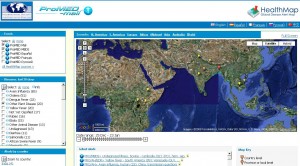- Mozzarella madness.
- Homegrown Evolutionist spreads his seed.
- There’s an International Seed Swap Day of Action? And we missed it?
- The new AJFAND is out.
- Brits belatedly bring back boars, but bumble bee buggered.
- Improving local livestock breeds in Zambia: VOA tells us how and why.
- Not armyworm after all.
- Cloning the ibex: close, but no cigar.
Call for info
Got any information on the effect of climate change on heritage apples? Barbara Tremain-Howard over at Fruit Forum would like to hear from you.
Nibbles: China, Coconut, Sheep, Water, Plums, Kew
- “These young people can’t farm.”
- Let the people tap!
- Wolf sighted in Massif Central. France surrenders.
- Fascinating discussion of how much water farmers “use”.
- “Blueberries have some stiff competition”. From plums.
- Millennium Seed Bank hit by credit crunch.
Online platform comes up short on agrobiodiversity
Via LEISA’s Farm comes news of INFONET-BioVision,
…an online information platform tailored to the rural population in East Africa. It offers information on sustainable agriculture and ecological control of plant-, human- and animal- targeting pests and disease vectors.
Leave aside for a moment the unlikelihood of many rural people in East Africa being able to access such a platform. 1 It does have a great deal of useful information on the agronomy of a large number of crops, including neglected ones, focusing on pest and disease control strategies. But there’s not as much as one might have hoped on the value of diversity. Although, for example, there’s a list of a few local and improved cultivars in the cassava section, I didn’t get the sense of genetic diversity management as a legitimate strategy for sustainability. On a par with “conservation tillage,” say. Pity.
Army worms on the march
I think I may have blogged before about the ProMED-mail “global electronic reporting system for outbreaks of emerging infectious diseases & toxins.” You can get email alerts and also produce maps for plant diseases, such as this one:

Unfortunately, the system only covers infectious diseases. It is a programme of the International Society for Infectious Diseases, after all. Otherwise, it would have picked up the plague of armyworms currently affecting Liberia. A quick search of my feed reader revealed outbreaks in Namibia and Zimbabwe within the past two years. And Google Trends shows some interesting, ahem, trends in searching News archives show this timeline for news of this pest 2 over the past few years:

There’s research on natural enemies going on, but that’s not going to help Liberia right now.